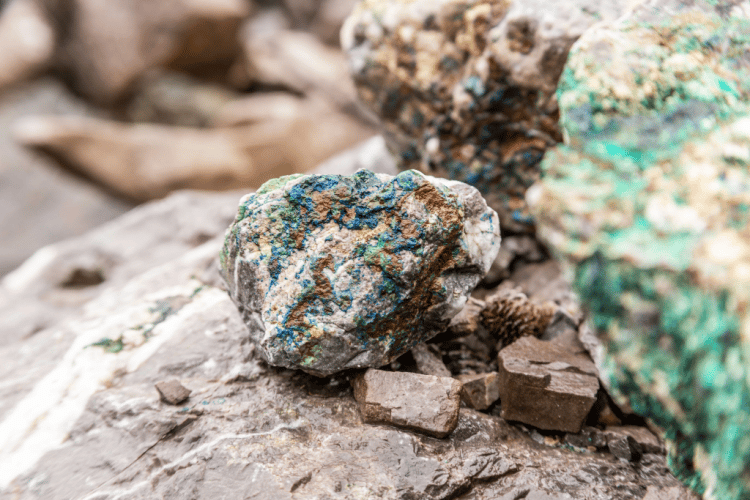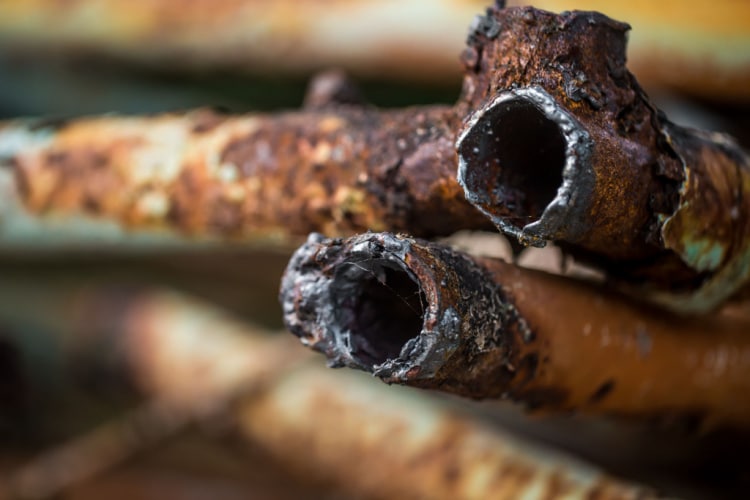Well water smells and tastes like metal due to the presence of metallic minerals like iron and manganese in the water. These metals get into the water as it moves through underground rocks and sediment. Rust from corroded pipes is also another possible culprit.
Here’s a tabular view of the different causes and solution:
| Reason for Metallic Smell & Taste | Solution |
|---|---|
| Metallic minerals (Lead, Copper, Iron and Manganese or Hard water minerals) | Install a well water filter system. (We recommend Springwell iron filter to remove Iron & Manganese, Springwell Whole house lead filter to remove lead ). Also consider installing a water softener if you also have hard water minerals. |
| Rust | Detect & replace corroded pipes, Then install a water filter system (We recommend Springwell iron filter). |
First, Get Your Water Tested
The first step is to get your water tested. Water testing will reveal the exact amount/concentration of metals that are in the water. Collect and send water samples from the well (and faucets) to an EPA-certified lab for testing. The lab result will then determine the next steps to take, which will most likely require getting a well water filtration system or completely replacing rusted pipes (if rust is the culprit).
If you need to get a well water filtration system, we recommend the Springwell Whole house filter system. Springwell is one of the leading water filter brands on the market.
Why Water Tastes Like Metal
Excess Lead or Iron & Manganese in the Water
If you water tastes like metal, it most likely contains excess concentration of minerals such as lead, copper, iron and manganese. These minerals are a concern for wells dug in a mineral-rich area, and the degree of contamination varies depending on the location. Even if your well doesn’t sit in a mineral-rich location, the minerals can still get into the water through surface runoff after flood or heavy rainfall.

Similar to lead, iron and manganese, calcium and magnesium are also minerals that can cause metallic taste in water, although they’re a less common culprit. These minerals are also known as hard water minerals.
Associated Health Concerns
Calcium and magnesium minerals (Hard water) don’t present a known health risk. However, they can negatively affect the skin and hair by making it dry and dull, which may lead to skin irritation and itching in some extreme cases.
Iron and Manganese are regulated by the EPA under the National Secondary Drinking Water Regulations, and pose no health threat so long as they’re within the allowable limit. However, excessive and prolonged manganese consumption may have negative effects on motor skills, attention, and memory.
The allowable limit for iron in water is 0.3 mg/L while the threshold for manganese is 0.05 mg/L. Only 15 µg/L of lead is allowed in water.
Solution to excess minerals in Water
Iron and manganese in water can be very difficult to remove and often requires a well water filtration system built specifically for this purpose. We recommend getting the Springwell well water system, which is currently the best iron and manganese water filter. To remove lead, get the Springwell Whole House Lead Filter.
Calcium and magnesium in water can be easily removed by installing a water softener. SpringWell water softener system is the best salt-based water softener for hard water.
A decent lead, iron and manganese water filter system costs $1000 – $2000, while a water softener can cost $1000 – $1,500 or up to $2000 in some cases.
Rust and Corrosion from Water Pipes
If your water still tastes like metal after installing a well water filter, and despite further test results revealing no presence of metals in the water source (well or tap), then it could be that your water pipes have corroded and is leeching rust into the water.
A water filter system removes metals from water before it gets into the house. However, the purified water can still get contaminated by rust (iron) if it flows through corroded pipes. This is why you should always test water samples from the well and a faucet inside the house.

Rust is the common name for iron oxide (Fe2O3), a complex form of iron consisting of oxides and hydroxides of iron. It occurs when oxygen from air and moisture combines and oxides the surface of iron (e.g pipes). Plumbing systems that use galvanized steel or cast-iron are more susceptible to rust and corrosion overtime. Although less common, well casing made of stainless steel can also leech rust into the well.
One thing to note though; if only the hot water smells like metal or rotten eggs, then the source is most likely from a corroded pipe in your water heater.
Associated Health Concerns
If the rust/corrosion is only due to iron, it’s not a health risk. On the contrary, iron is essential for healthy nutrition. However, the same can’t be said for copper and lead.
If lab results show contamination by lead or copper in your water sample, you should immediately stop consuming the water, as these two heavy metals are associated with many health hazards.
The EPA establishes that there should be no lead in drinking water. It can negatively impact children’s neural and mental development, and causes kidney problems and high blood pressure in adults. Immuno-compromised people can also suffer from stomach issues, anemia, or memory loss after lead intake.
Although 1.3 mg/L of copper is allowed in the drinking water by the EPA, it’s not exactly safe to consume. In the short term, it can cause gastrointestinal distress. Kidney and liver diseases are long term effects of copper consumption. People with chronological diseases and vulnerable immune systems may also experience severe headaches, diarrhea, and vomiting from consuming copper.
Solution to Rust and Corrosion
If corroded water pipes are leeching rust into the water, the best solution is to replace the pipes with new ones. Depending on local regulations, PEX, PVC and Copper are the most common water pipes in modern day homes. You should seek guidance from a professional plumber.
If the corrosion is from your well casing, then also consider replacing the stainless steel casing with PVC casing. PVC casing costs around $6 per ft which is significantly cheaper than $130 per ft stainless steel casing.
Conclusion
If your well water smells like metal, it’s either because of a superabundance of minerals in the water source or rust and corrosion.
Hard water doesn’t present a health concern, but you might still want to handle it. In that case, water treatment systems like water softeners and whole house filtration can help you.
However, corrosion, especially if there’s lead and copper involved, is a much more serious problem, and it needs to be taken care of immediately. You can do that by identifying the faulty parts and replacing them.
Similar Well Water Contamination Problems:
I found this article on dealing with a metal taste and smell in well water very helpful. The tips provided for identifying and addressing the issue are practical and easy to understand. Thank you to the author for sharing this valuable information and helping homeowners tackle this common problem. Great job!